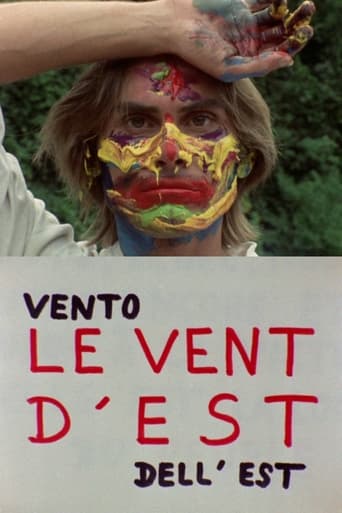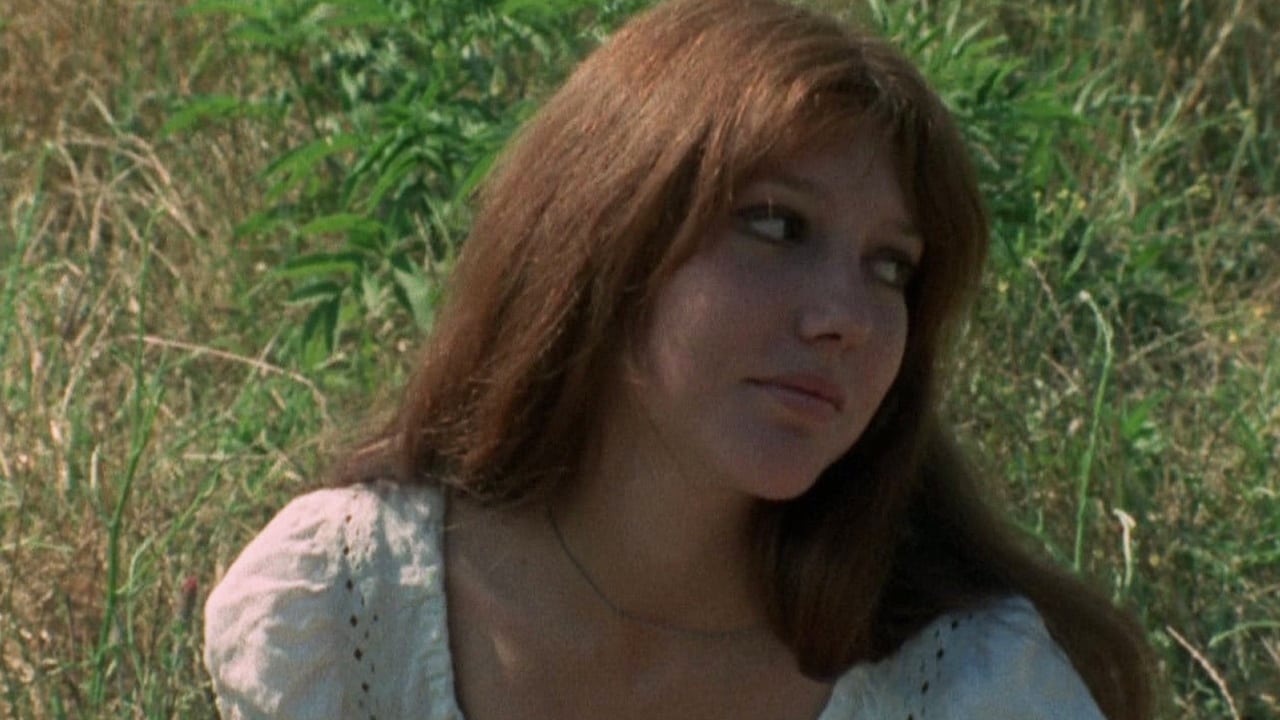Gloede_The_Saint
Whatever you feel about the French New Wave and Godards work in this period we have to realize one thing - it had imprisoned him. The wave he himself had co-created would tie him to norms. Now it was gone. He was no longer in the searchlight, his films got smaller and smaller.JLG was always experimental, always unique and often too much in his own world to be relatable for the public. However, he had for a certain time been an icon. Now, he was free. He could make whatever he wanted, regardless of form and norms. The end of the New Waves marks the beginning of his experimental awakening and the growth of his love for cinema.In all regards Wind From the East can be considered an "anti"-film. A film so far from the norm of what beauty and storytelling is that it becomes an example of just that. A exercise of creativity, of styles and of ideas.Emotionally, I get throwback to Jancso's Red Psalm(which ironically was made a two years later), because this is indeed a work of communist art - A political belief system that does not coincide with my own, from a time that disappeared long before I was born.It speaks of revolution and violence as so many other Godards have done, but here it becomes part of both the abstract and the unconscious. But then, this is what beauty is. It's poetry - pure but perhaps not too simple. It reflects times that are gone, ideas left behind and a world unknown.
where's da feesh
When one enters a movie theater with the intention to watch a Godard film, one has to bear in mind that: 1)it will not be a 'regular', that is 'industrial' film, with linear narrative; and 2)there will be a strong reaction from the viewer (usually negative, especially from people who are not used to watching this authorial/Nouvelle Vague/Cinema Novo type of film, and even more especially on those that says 'mise-en-scène: Jean-Luc Godard' somewhere during the credits."Wind From the East" ("Le Vent D'Est", "Vento do Leste") is a very deep and highly political discussion about communism, capitalism, art, revolution, intellectualism, Maoism, USSR, tradition, paradigms, poetry... It's hard to put it in terms of "it's about...", since the sequence of images is not based in any form of traditional narrative. In fact, it's the very opposite of it, its essence sprouting from the need of subversion, a need directly connected to the social/historical/political/artistic context of the 60's and 70's: to show things in a different way leads the viewer to see differently, therefore to think differently. A experimental cut, poetic even, given the metaphorical quality of the images. The frontiers of film language fades and encounters those of other art forms, not to weaken the film unity nor its message, but to strengthen them both.One highlight (attention, should NOT be taken as a spoiler): the featuring of Glauber Rocha, director representative of Brazilian Cinema Novo (whose political attitude towards cinema establishes the proper dialog with Group Dziga Vertov's intention), singing Gal Costa's "Divino, Maravilhoso" (something like "Divine, Wonderful").Long story short: a wonderful film, Godard in tip-top shape! For stuff alike watch "Sympathy for the Devil:One Plus One" [1968], featuring the creative process in which the Stones made song number one from "Beggars Banquet".
David Edward Martin
You know those "worst films of all time" lists? This one tops my list!How to describe it? The film is a long pointless diatribe against the West and an endorsement of French Communism. The film supposedly illustrates crimes against society committed by the west but the acting (and costuming) looked like a Haight Ashbury Summer'o'Love stock production.The film is very grainy. Apparently Godard shot it on 8mm film. His disciples then blew it up to 35mm for its extremely limited arthouse release. The copy I suffered through had been shrunk back to 16mm (the format for rental films).Oh, and the narration? Godard's diatribe is delivered by a somewhat bored Frenchman. That was bad enough but Godard's disciples had added an English-speaking female narrator to make the politics accessible to western audiences. The problem was, Godard refused to let them delete the French voicetrack! So.... for two wretched hours, the French and English narrations go on SIMULTANEOUSLY! Add to this the lousy acting, minimal production, and grainy film and you have EXCEDERIN HEADACHE #1.
matt-201
I saw a tatty 16mm print of this lost work of Godard's "engaged" period as a freshman in college in an empty theatre. The memory of it remains fresh--WIND FROM THE EAST struck me as Godard's most uniquely beautiful picture. A melding of tactics seminar and an overview of the history of the Western, the movie joins Godard's two great passions--cinema and politics--in a more harmonic convergence than he ever achieved elsewhere, as if Chou En-Lai collaborated with Mozart on rewrites of "The Abduction from the Seraglio."


 AD
AD


